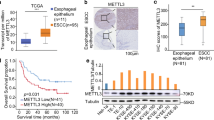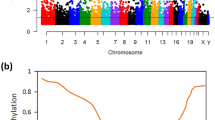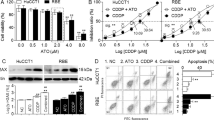Abstract
Cholangiocarcinoma (CCA), known for its aggressive nature, poses a formidable challenge in the current medical landscape, particularly in targeted therapies. Against this backdrop, long non-coding RNAs (lncRNAs) have captured the attention of researchers. These unique RNAs are believed to play pivotal roles in various cancers, offering promising avenues for the development of more effective treatment strategies. Previous studies have substantiated the aberrant expression of the APCDD1L-DT in numerous human tumors, demonstrating its positive regulatory roles in disease progression. Nevertheless, the biological functions of APCDD1L-DT in CCA are still not fully understood. This study marks the inaugural documentation of APCDD1L-DT exhibiting aberrant expression in CCA specimen, establishing a close correlation with the TNM staging of tumor patients. Furthermore, suppressing APCDD1L-DT expression hinders both the viability and motility of tumor cells. Mechanistically, the abnormal activation of the transcription factor ZNF460 positively regulated APCDD1L-DT expression in CCA. This activation, in turn, propels the abnormal activation of the Wnt pathway, fostering tumor development by impeding the ubiquitin-mediated degradation of DVL2. Broadly speaking, this study provides auspicious perspectives for comprehending CCA and furnishes support for addressing this daunting malignancy.
This is a preview of subscription content, access via your institution
Access options
Subscribe to this journal
Receive 12 print issues and online access
269,00 € per year
only 22,42 € per issue
Buy this article
- Purchase on SpringerLink
- Instant access to full article PDF
Prices may be subject to local taxes which are calculated during checkout







Similar content being viewed by others
Data availability
The datasets generated during the current study are available from the corresponding author upon reasonable request.
References
Singal AG, Rakoski MO, Salgia R, Pelletier S, Welling TH, Fontana RJ, et al. The clinical presentation and prognostic factors for intrahepatic and extrahepatic cholangiocarcinoma in a tertiary care centre. Aliment Pharm Ther. 2010;31:625–33.
Koerkamp BG, Clavien PA, Polak WG. Surgical resection for intrahepatic cholangiocarcinoma-can we really improve survival by resecting more lymph nodes? J Hepatol. 2023;78:235–7.
Cai J, Cui Z, Zhou J, Zhang B, Lu R, Ding Y, et al. METTL3 promotes glycolysis and cholangiocarcinoma progression by mediating the m6A modification of AKR1B10. Cancer Cell Int. 2022;22:385.
Wang X, Wang G, Wu Z, Dong Y, Shi Y, Yang F, et al. Exosomal circ-PTPN22 and circ-ADAMTS6 mark T cell exhaustion and neutrophil extracellular traps in Asian intrahepatic cholangiocarcinoma. Mol Ther Nucleic Acids. 2023;31:151–63.
Ding DY, Gan XJ, Zhang JN, Hou GJ, Tao QF, Sun DP, et al. Serum thrombospondin-1 serves as a novel biomarker and agonist of gemcitabine-based chemotherapy in intrahepatic cholangiocarcinoma. Br J Cancer. 2023;128:907–17.
Sae-Fung A, Mutirangura A, Jitkaew S. Identification and validation of a novel ferroptosis-related gene signature for prognosis and potential therapeutic target prediction in cholangiocarcinoma. Front Immunol. 2022;13:1051273.
Uijterwijk BA, Lemmers DHL, Bolm L, Luyer M, Koh YX, Mazzola M, et al. Long-term outcomes after laparoscopic, robotic, and open pancreatoduodenectomy for distal cholangiocarcinoma: an international propensity score-matched cohort study. Ann Surg. 2023;278:e570–e579.
Zhong X, Ji C, Ren D, Ke A, Yang Z. Circular RNA circEIF3C promotes intrahepatic cholangiocarcinoma progression and immune evasion via the miR-34a-5p/B7-H4 axis. Genes Dis. 2023;10:370–2.
Shridhar R, Blinn P, Huston J, Meredith KL. Outcomes of adjuvant radiation therapy after chemotherapy in resected extrahepatic cholangiocarcinoma: A National Cancer Database analysis. Cancer. 2023;129:890–900.
Jones O, Cheng X, Murthy SRK, Ly L, Zhuang T, Basadonna G, et al. The synergistic effect of Canady Helios cold atmospheric plasma and a FOLFIRINOX regimen for the treatment of cholangiocarcinoma in vitro. Sci Rep. 2021;11:8967.
Louis C, Ferlier T, Leroux R, Pineau R, Desoteux M, Papoutsoglou P, et al. TGFbeta-induced circLTBP2 predicts a poor prognosis in intrahepatic cholangiocarcinoma and mediates gemcitabine resistance by sponging miR-338-3p. JHEP Rep. 2023;5:100900.
Lee CK, Chon HJ, Cheon J, Lee MA, Im HS, Jang JS, et al. Trastuzumab plus FOLFOX for HER2-positive biliary tract cancer refractory to gemcitabine and cisplatin: a multi-institutional phase 2 trial of the Korean Cancer Study Group (KCSG-HB19-14). Lancet Gastroenterol Hepatol. 2023;8:56–65.
Eptaminitaki GC, Stellas D, Bonavida B, Baritaki S. Long non-coding RNAs (lncRNAs) signaling in cancer chemoresistance: from prediction to druggability. Drug Resist Updat. 2022;65:100866.
Tan H, Zhang S, Zhang J, Zhu L, Chen Y, Yang H, et al. Long non-coding RNAs in gastric cancer: new emerging biological functions and therapeutic implications. Theranostics. 2020;10:8880–902.
Wang J, Tan L, Yu X, Cao X, Jia B, Chen R, et al. lncRNA ZNRD1-AS1 promotes malignant lung cell proliferation, migration, and angiogenesis via the miR-942/TNS1 axis and is positively regulated by the m(6)A reader YTHDC2. Mol Cancer. 2022;21:229.
Zhang Y, Xu L, Ren Z, Liu X, Song J, Zhang P, et al. LINC01615 maintains cell survival in adaptation to nutrient starvation through the pentose phosphate pathway and modulates chemosensitivity in colorectal cancer. Cell Mol Life Sci. 2022;80:20.
Zhou Y, Xu Z, Wang Y, Song Q, Yin R. LncRNA MALAT1 mediates osteogenic differentiation in osteoporosis by regulating the miR-485-5p/WNT7B axis. Front Endocrinol. 2022;13:922560.
Liu Y, Choy MK, Abraham S, Tenin G, Black GC, Keavney BD. Atrial septal defect (ASD) associated long non-coding RNA STX18-AS1 maintains time-course of in vitro cardiomyocyte differentiation. Genes Dis. 2023;10:1150–3.
Kang H, Huang D, Li H, Deng X, Liu S, Gou W, et al. lncNALT knockdown ameliorates hypertensive retinopathy via PTEN/PI3K/AKT pathway. Bioengineered. 2022;13:15003–12.
Duwe L, Munoz-Garrido P, Lewinska M, Lafuente-Barquero J, Satriano L, Hogdall D, et al. MicroRNA-27a-3p targets FoxO signalling to induce tumour-like phenotypes in bile duct cells. J Hepatol. 2023;78:364–75.
Lu Y, Li S, Song S, Wang L, Chen Y, Jiang X, et al. A lncRNA MEG3 variant enhances telomerase activity by increasing DNA damage repair ability in human liver cancer stem cells. Genes Dis. 2023;10:1763–6.
Zhang Y, Fang Y, Ma L, Xu J, Lv C, Deng L, et al. LINC00857 regulated by ZNF460 enhances the expression of CLDN12 by sponging miR-150-5p and recruiting SRSF1 for alternative splicing to promote epithelial-mesenchymal transformation of pancreatic adenocarcinoma cells. RNA Biol. 2022;19:548–59.
Zhu L, Yang X, Feng J, Mao J, Zhang Q, He M, et al. CYP2E1 plays a suppressive role in hepatocellular carcinoma by regulating Wnt/Dvl2/beta-catenin signaling. J Transl Med. 2022;20:194.
Ju Q, Zhao YJ, Ma S, Li XM, Zhang H, Zhang SQ, et al. Genome-wide analysis of prognostic-related lncRNAs, miRNAs and mRNAs forming a competing endogenous RNA network in lung squamous cell carcinoma. J Cancer Res Clin Oncol. 2020;146:1711–23.
Wu J, Zheng C, Wang Y, Yang Z, Li C, Fang W, et al. LncRNA APCDD1L-AS1 induces icotinib resistance by inhibition of EGFR autophagic degradation via the miR-1322/miR-1972/miR-324-3p-SIRT5 axis in lung adenocarcinoma. Biomark Res. 2021;9:9.
Yang W, Zhou J, Zhang Z, Zhang K, Xu Y, Li L, et al. Downregulation of lncRNA APCDD1L-AS1 due to DNA hypermethylation and loss of VHL protein expression promotes the progression of clear cell renal cell carcinoma. Int J Biol Sci. 2022;18:2583–96.
Hao T, Xu J, Fang S, Jiang J, Chen X, Wu W, et al. Overexpression of ZNF460 predicts worse survival and promotes metastasis through JAK2/STAT3 signaling pathway in patient with colon cancer. J Cancer. 2021;12:3198–208.
Shao X, Zhong L, Chu X, Wan P, Chen S, Zhou Z, et al. ZNF460-regulated COMMD7 promotes acute myeloid leukemia proliferation via the NF-kappaB signaling pathway. Int J Med Sci. 2023;20:520–9.
Zhao D, Zhong G, Li J, Pan J, Zhao Y, Song H, et al. Targeting E3 ubiquitin ligase WWP1 prevents cardiac hypertrophy through destabilizing DVL2 via inhibition of K27-linked ubiquitination. Circulation. 2021;144:694–711.
Deng YZ, Yao F, Li JJ, Mao ZF, Hu PT, Long LY, et al. RACK1 suppresses gastric tumorigenesis by stabilizing the beta-catenin destruction complex. Gastroenterology. 2012;142:812–23.e15.
Kim SO, Cho KS, Kim BY, Lee KH. Cullin 1 (CUL1) promotes primary ciliogenesis through the induction of ubiquitin-proteasome-dependent Dvl2 degradation. Int J Mol Sci. 2021;22:7572.
Wang Y, Wang M, Chen J, Li Y, Kuang Z, Dende C, et al. The gut microbiota reprograms intestinal lipid metabolism through long noncoding RNA Snhg9. Science. 2023;381:851–7.
Wei W, Li M, Wang J, Nie F, Li L. The E3 ubiquitin ligase ITCH negatively regulates canonical Wnt signaling by targeting dishevelled protein. Mol Cell Biol. 2012;32:3903–12.
Zou C, Li X, Lv X, Wu S, Song J, Tang Z, et al. Circular RNA mitochondrial translation optimization 1 homologue (CircMTO1) induced by zinc finger protein 460 (ZNF460) promotes oral squamous cell carcinoma progression through the microRNA miR-320a/alpha thalassemia/mental retardation, X-linked (ATRX) axis. Bioengineered. 2021;12:9585–97.
Villard C, Friis-Liby I, Rorsman F, Said K, Warnqvist A, Cornillet M, et al. Prospective surveillance for cholangiocarcinoma in unselected individuals with primary sclerosing cholangitis. J Hepatol. 2023;78:604–13.
Arechederra M, Casadei Gardini A, Raggi C. More than shots in the dark: improving patient stratification to move closer to personalised therapies in intrahepatic cholangiocarcinoma. Gut. 2024;73:389–90.
Kim KH, Yi HS, Lee H, Bae GE, Yeo MK. Targeting the sequences of circulating tumor DNA of cholangiocarcinomas and its applications and limitations in clinical practice. Int J Mol Sci. 2023;24:7512.
Arun G, Diermeier SD, Spector DL. Therapeutic targeting of long non-coding RNAs in cancer. Trends Mol Med. 2018;24:257–77.
Hong P, Huang W, Du H, Hu D, Cao Q, Wang Y, et al. Prognostic value and immunological characteristics of a novel cuproptosis-related long noncoding RNAs risk signature in kidney renal clear cell carcinoma. Front Genet. 2022;13:1009555.
Shi CJ, Lv MY, Deng LQ, Zeng WQ, Fu WM, Zhang JF. Linc-ROR drive adriamycin resistance by targeting AP-2alpha/Wnt/beta-catenin axis in hepatocellular carcinoma. Cell Biol Toxicol. 2023;39:1735–52.
Xie N, Zhang R, Bi Z, Ren W, You K, Hu H, et al. H3K27 acetylation activated long noncoding RNA RP11-162G10.5 promotes breast cancer progression via the YBX1/GLO1 axis. Cell Oncol. 2023;46:375–90.
Yan H, Wang Z, Sun Y, Hu L, Bu P. Cytoplasmic NEAT1 suppresses AML stem cell self-renewal and leukemogenesis through inactivation of Wnt signaling. Adv Sci. 2021;8:e2100914.
Jia Y, Zhao H, Niu Y, Wang Y. Identification of birch lncRNAs and mRNAs responding to salt stress and characterization of functions of lncRNA. Hortic Res. 2023;10:uhac277.
Li S, Shi Z, Fu S, Li Q, Li B, Sang L, et al. Exosomal-mediated transfer of APCDD1L-AS1 induces 5-fluorouracil resistance in oral squamous cell carcinoma via miR-1224-5p/nuclear receptor binding SET ___domain protein 2 (NSD2) axis. Bioengineered. 2021;12:7188–204.
Winkle M, El-Daly SM, Fabbri M, Calin GA. Noncoding RNA therapeutics—challenges and potential solutions. Nat Rev Drug Discov. 2021;20:629–51.
Acknowledgements
This work was supported by the Heilongjiang Postdoctoral Science Foundation (Grant No. LBH-Q21023) and the National Natural Science Foundation of China (Grant No. 82270599).
Author information
Authors and Affiliations
Contributions
XG, XLZ, CHGm, and XJS designed and executed the experiments. SDL collected the data. XYZ and XMJ provided the experimental resources. XMZ and CRY wrote and modified the paper. All authors have read and approved the final paper.
Corresponding authors
Ethics declarations
Competing interests
The authors declare no competing interests.
Ethical approval
This work was conducted in accordance with the Declaration of Helsinki and approved and approved by the Ethics Committee of The 2nd Affiliated Hospital of Harbin Medical University.
Additional information
Publisher’s note Springer Nature remains neutral with regard to jurisdictional claims in published maps and institutional affiliations.
Supplementary information
Rights and permissions
Springer Nature or its licensor (e.g. a society or other partner) holds exclusive rights to this article under a publishing agreement with the author(s) or other rightsholder(s); author self-archiving of the accepted manuscript version of this article is solely governed by the terms of such publishing agreement and applicable law.
About this article
Cite this article
Gao, X., Zou, X., Guan, C. et al. ZNF460-mediated upregulation of APCDD1L-DT promotes cholangiocarcinoma development by inhibiting the ubiquitin-mediated degradation of DVL2. Cancer Gene Ther 31, 1585–1597 (2024). https://doi.org/10.1038/s41417-024-00826-z
Received:
Revised:
Accepted:
Published:
Issue Date:
DOI: https://doi.org/10.1038/s41417-024-00826-z



